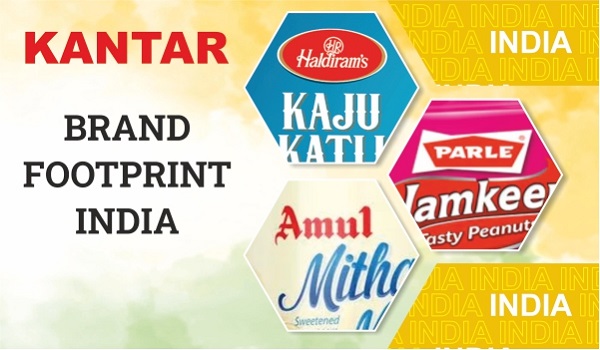
The latest Kantar Brand Footprint Report for India provides a comprehensive overview of the most chosen Fast-Moving Consumer Goods (FMCG) brands, spotlighting indigenous brands such as Haldiram’s, Amul, and Parle Products.
This article reviews the report’s parameters and insights, exploring how these homegrown brands are not only dominating the domestic market but also making significant strides globally.
The Kantar Brand Footprint Report ranks FMCG brands based on Consumer Reach Points (CRPs), which measure how often a brand is purchased by consumers and the frequency of these purchases within a calendar year. This metric provides a clear picture of a brand’s market penetration and consumer loyalty. In 2024, Parle Products, Britannia, Haldiram’s, and Amul will have emerged as leaders, showcasing their extensive reach and strong consumer base in India.
Haldiram’s journey began in the 1930s as a small sweet shop in Bikaner, Rajasthan. The brand’s focus on quality and authenticity quickly won over Indian consumers, and by the 1980s, it had expanded to major cities across the country. Today, Haldiram’s is a household name synonymous with traditional Indian snacks and sweets.
The report highlights Haldiram’s innovative strategies, including product diversification and modernization of production processes. The brand has continually expanded its product line to include ready-to-eat meals and frozen foods, catering to a wide range of consumer preferences. This ability to innovate while maintaining quality has been crucial to its success.
Haldiram’s has successfully penetrated international markets, with products now available in over 80 countries. The brand’s strategy includes forming alliances with local distributors and participating in international food expos. By catering to the tastes of the Indian diaspora and introducing global consumers to Indian flavours, Haldiram’s has established a significant international footprint.
Amul’s story is one of socio-economic revolution. Founded in 1946, Amul (Anand Milk Union Limited) is a cooperative that transformed India’s dairy industry by empowering millions of dairy farmers. This model has ensured fair prices and eliminated middlemen, providing a stable income for farmers.
The report underscores Amul’s robust supply chain and continuous product diversification as key factors in its success. From milk and butter to cheese, chocolates, and ice creams, Amul products are integral to Indian households. Memorable advertising campaigns have further cemented its popularity.
Amul has ventured into international markets, targeting regions with significant Indian populations. Its products are available in over 50 countries, including the USA, Canada, Australia, and the Middle East. Due to its focus on quality, the brand has gained international recognition and its products are available in both ethnic and mainstream grocery stores abroad.
Parle Products started in 1929 with a single biscuit factory in Mumbai. The brand revolutionized the Indian biscuit market with Parle-G, one of the world’s largest-selling biscuit brands. Parle’s ability to offer quality products at affordable prices has been central to its success.
The Kantar report highlights Parle’s diversification into confectionery, snacks, and beverages. The brand’s extensive distribution network ensures its products reach even the most remote areas of India, making them ubiquitous across the country.
Parle Products has made significant inroads into international markets, exporting to over 100 countries. The brand’s strategy includes understanding local tastes and preferences and adapting its products accordingly, a tactic that has helped it gain a foothold in competitive markets.
A crucial aspect of these brands’ growth, as highlighted in the Kantar report, is their deep understanding of consumer preferences. Haldiram’s, Amul, and Parle have invested heavily in market research to tailor their products to both domestic and international consumers. This adaptability has allowed them to resonate well beyond their traditional markets.
Continuous innovation and stringent quality assurance processes have been vital. These brands have modernized their production facilities and adopted international standards to ensure their products meet global quality benchmarks. This commitment to quality has been instrumental in building trust and loyalty among consumers worldwide.
Effective marketing strategies and strong branding have played a significant role in their success. The report emphasizes how these brands have leveraged digital media, celebrity endorsements, and culturally resonant advertising campaigns to enhance brand visibility and appeal.
Despite their success, these brands face several challenges in the global market. They must navigate different regulatory environments, compete with established local and international brands, and manage supply chain complexities. However, these challenges also present opportunities for innovation and growth. By leveraging their unique value propositions and continuing to adapt to changing market dynamics, these brands are well-positioned to expand their global footprint.
The potential for growth of these indigenous brands is immense. The increasing global interest in diverse cuisines, coupled with the growing purchasing power of the Indian diaspora, provides fertile ground for expansion. Brands like Haldiram’s, Amul, and Parle are well-equipped to capitalize on these trends and become global icons.
To achieve this, these brands must continue to innovate and adapt. Investing in research and development to create new products that cater to global tastes, enhancing their digital presence to reach a wider audience, and building strong partnerships with local distributors are crucial steps. Additionally, maintaining their commitment to quality and authenticity will ensure they stand out in the competitive global market.
The rise of Haldiram’s, Amul, and Parle Products signals a new era for Indian brands. Their success stories inspire other indigenous brands to dream big and aspire for global recognition. With the right strategies and a relentless focus on quality and innovation, Indian brands have the potential to become household names worldwide, just like their American counterparts.
In conclusion, the Kantar Brand Footprint Report 2024 highlights the remarkable growth of indigenous brands like Haldiram’s, Amul, and Parle Products. Their journeys showcase the importance of understanding consumer preferences, maintaining quality, and continually innovating. As these brands continue to expand their global footprint, they pave the way for other Indian brands to follow, heralding a new era of global recognition and success for Indian enterprises.


